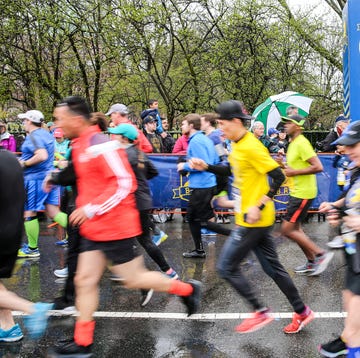We all know what happens to the carbohydrate stores in your muscles during and after prolonged exercise. You start with a baseline level of glycogen (the form in which carbohydrate is stored in your body), which is gradually depleted during exercise. If you keep going long enough (~90-120 minutes), you can completely empty these glycogen stores. Then, in the hours afterward, your glycogen stores “supercompensate,” so that 24 hours after your workout, you have higher glycogen levels than you started with in the first place. And if you do this sort of training on a regular basis, your body will respond by gradually increasing the baseline level of glycogen in your muscles.
What I didn’t realize is that exactly the same process occurs in your brain. Thanks to a Twitter conversation with Ben Rattray, What I didnt realize is that exactly the same process occurs in your brain. Thanks to this study published earlier this year in the Journal of Physiology by researchers in Japan. Here’s the key graph:
The brain is pretty greedy – under normal circumstances, it uses about 20 percent of the glucose (i.e. sugar) circulating in your blood. During intense exercise, glucose levels get low and the brain, like the muscles, has to start relying on stored glycogen. Sure enough, the graph above shows lower brain glycogen levels right after exercise, which recover and are supercompensated 3 and 6 hours after exercise, then back to normal 24 hours later. Note that this cycle is quicker than the muscle supercompensation, which doesn’t peak until 24 hours after exercise – more evidence that the brain takes priority and gets first crack at any available fuels.
In the second part of the experiment, the researchers did a four-week training study, which showed that – again, just like muscles – baseline levels of glycogen in the brain gradually increased with training. (I should clarify here that these experiments were done with rats – a necessity since you can’t measure glycogen levels in the brain in living subjects.)
So what does this mean? Well, one thing that’s interesting is this training effect that produces higher baseline levels of glycogen. It’s well known that regular exercise boosts cognitive function; there are probably a number of different mechanisms that contribute to this effect, but the researchers suggest that bigger glycogen stores could be one of them.
The other big question is whether the decrease in glycogen during exercise contributes to “central” fatigue. If you’re running as hard as you can and you start to slow down, is it partly because your neurons are running low on fuel, making it hard for you to maintain the mental effort required to push yourself to your limits? This is a very complicated (and controversial) question – establishing that the brain uses up lots of glycogen during exercise certainly doesn’t prove that glycogen shortage causes fatigue.
Still, it’s interesting to think about. By doing endurance training, we really are training and modifying our brains in the same way we’re modifying our muscles. And maybe (as Ben suggested in our Twitter conversation) the mental effort of pushing to exhaustion really does burn a significant number of calories, adding another reason that all-out exercise burns more energy than covering the same distance at a relaxed pace.
“Supercompensating” Your Brain’s Fuel Stores
Races - Places.
Watch Next

What I didnt realize is that exactly the same process occurs in your brain. Thanks to

Ways to Make Running This Winter More Enjoyable

What's a Good 5K Time?

DAA Industry Opt Out

How to Start Running
What I didnt realize is that exactly the same process occurs in your brain. Thanks to
What I didnt realize is that exactly the same process occurs in your brain. Thanks to








